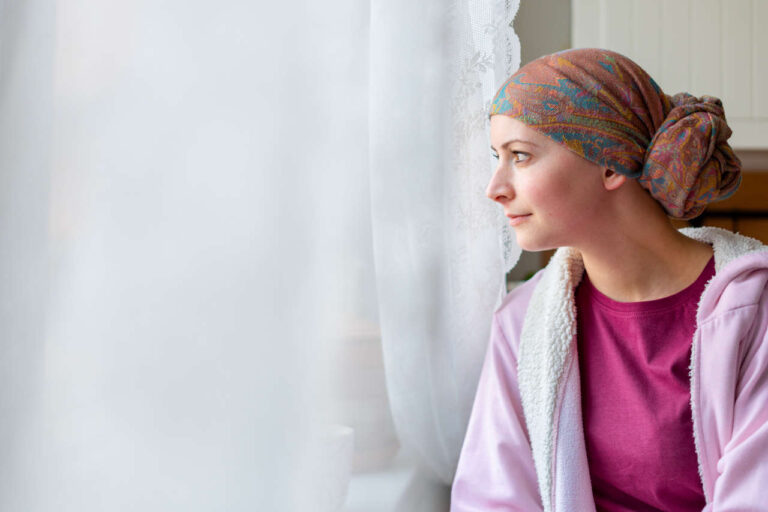
If you have been recently diagnosed with cancer or are in the midst of cancer treatment, your doctor may recommend that you practice yoga.
Get Chemotherapy Copay Assistance
Chemotherapy Financial AssistanceSeveral research studies have uncovered the benefits of yoga for cancer patients. Cancer patients undergo repetitive painful treatments to regain health and also experience psychological distress and emotional trauma. In many cases, yoga can help patients cope with mental and physical distress and improve their overall quality of life.
Although yoga does not cure cancer, it is found to be beneficial for easing psychological symptoms or adverse side effects associated with the disease and its treatment. Some of the conditions yoga can alleviate include stress, depression, sleep disturbances or insomnia, pain, fatigue (tiredness), and anxiety.
This article provides basic information about yoga and how it can help cancer patients physically, mentally, and spiritually.
What Is Yoga?
Yoga is an ancient therapeutic practice that is used to calm your mind and emotions. This mind-body intervention, with its slow and gentle motions, increases physical strength and boosts flexibility in patients who are otherwise physically limited (e.g., from having a severe stage of cancer).
While there are different types of yoga, less strenuous yoga, like gentle hatha yoga and restorative yoga, is reported to be most effective for cancer patients to combat treatment-associated symptoms.
Benefits of Yoga for Cancer Patients
Various studies have looked at the benefits of yoga in cancer patients and reported some of its physical and mental health benefits.
Benefits of Yoga on Physical Health

Yoga improves physical functioning in cancer patients. Prolonged bed rest or being sick all the time from cancer affects patients’ muscle flexibility, strength, and muscle tone and makes their bodies stiff and sore. In general, their activity level is compromised dramatically due to various cancer treatments.
In addition, patients receiving chemotherapy often experience chemotherapy-induced peripheral neuropathy (CIPN) — a serious side effect of chemotherapy mainly characterized by pain, muscle weakness, numbness, and tingling sensations in the hands and feet.
A small preliminary study conducted on cancer survivors revealed that doing yoga for 8 weeks improved their muscle flexibility and balance, with a reduced risk of falls.
Similarly, a meta-analysis of 16 trials showed that regular yoga practice moderately improved the muscle strength, physical activity, and functional well-being in cancer patients and cancer survivors.
Besides physical movement, yoga also improves other issues like insomnia, fatigue, and pain.
Yoga and Sleep Cycle
Disturbed sleep cycles are one of the treatment-associated side effects that some cancer patients experience. Moreover, stress and disturbed mental health also affect the sleep quality of cancer patients.
Cancer patients need ample rest to heal, and research shows that combining gentle yoga postures with breathing exercises and meditation can help to improve sleep quality.
Yoga and Fatigue
Fatigue is a common symptom that cancer patients and survivors often experience. A mindful intervention like yoga or meditation can help in reducing cancer-related fatigue.
A review of ten articles reported that yoga significantly decreased cancer-related fatigue in women.
Likewise, another study reported that women with breast cancer who took a yoga program twice a week for 8 weeks felt improvement in their fatigue compared to those who did not.
Consult a Chemotherapy Specialist
Get Chemotherapy Treatment AssistanceYoga and Pain
According to research, cancer-related pain can be reduced if yoga is used as a complementary treatment.
A pilot study further supported this hypothesis and showed that yoga intervention was quite helpful in lowering pain and boosting daily invigoration in patients.
Benefits of Yoga on Mental Health
Apart from physical health, yoga has been used in the management of several mental health issues in cancer patients. Yoga can reduce stress, depression, and anxiety in both cancer patients and cancer survivors.
A systematic review of four studies concluded that mindful-based intervention is potentially promising for psychological outcomes, quality of life, and post-traumatic growth symptom improvement in men with prostate cancer.
Furthermore, various studies have validated the beneficial effects of yoga in women with breast cancer. In addition to standard cancer treatment, yoga can be used as supportive therapy to reduce depression and stress and improve mental health and quality of life.
Similarly, cancer patients practicing daily yoga tend to experience less emotional and psychological distress related to their disease than those who do not.
Yoga, therefore, offers a multitude of both physical and mental benefits to people suffering from cancer. Your oncologist or healthcare provider can help you choose the best type of yoga depending on your physical and mental health status.
REFERENCES:
- Smith, K. B., & Pukall, C. F. (2009). An evidence‐based review of yoga as a complementary intervention for patients with cancer. Psycho‐oncology: Journal of the Psychological, Social and Behavioral Dimensions of Cancer, 18(5), 465-475.
- Bower, J. E., Woolery, A., Sternlieb, B., & Garet, D. (2005). Yoga for cancer patients and survivors. Cancer control, 12(3), 165-171.
- Zhi, W. I., Baser, R. E., Zhi, L. M., Talukder, D., Li, Q. S., Paul, T., … & Bao, T. (2021). Yoga for cancer survivors with chemotherapy‐induced peripheral neuropathy: Health‐related quality of life outcomes. Cancer Medicine, 10(16), 5456-5465.
- Buffart, L. M., van Uffelen, J. G., Riphagen, I. I., Brug, J., van Mechelen, W., Brown, W. J., & Chinapaw, M. J. (2012). Physical and psychosocial benefits of yoga in cancer patients and survivors, a systematic review and meta-analysis of randomized controlled trials. BMC cancer, 12(1), 1-21.
- Mustian, K. M., Sprod, L. K., Janelsins, M., Peppone, L. J., Palesh, O. G., Chandwani, K., … & Morrow, G. R. (2013). Multicenter, randomized controlled trial of yoga for sleep quality among cancer survivors. Journal of Clinical Oncology, 31(26), 3233.
- Rao, R. M., Amritanshu, R., Vinutha, H. T., Vaishnaruby, S., Deepashree, S., Megha, M., … & Ajaikumar, B. S. (2017). Role of yoga in cancer patients: Expectations, benefits, and risks: A review. Indian journal of palliative care, 23(3), 225.
- Sadja, J., & Mills, P. J. (2013). Effects of yoga interventions on fatigue in cancer patients and survivors: a systematic review of randomized controlled trials. Explore, 9(4), 232-243.
- Carson, J. W., Carson, K. M., Porter, L. S., Keefe, F. J., Shaw, H., & Miller, J. M. (2007). Yoga for women with metastatic breast cancer: results from a pilot study. Journal of pain and symptom management, 33(3), 331-341.
- Danhauer, S. C., Addington, E. L., Cohen, L., Sohl, S. J., Van Puymbroeck, M., Albinati, N. K., & Culos‐Reed, S. N. (2019). Yoga for symptom management in oncology: a review of the evidence base and future directions for research. Cancer, 125(12), 1979-1989.
- Cramer, H., Lauche, R., Klose, P., Lange, S., Langhorst, J., & Dobos, G. J. (2017). Yoga for improving health‐related quality of life, mental health and cancer‐related symptoms in women diagnosed with breast cancer. Cochrane Database of Systematic Reviews, (1).
- Mindfulness-based interventions for psychological wellbeing and quality of life in men with prostate cancer: A systematic review and meta-analysis. Psychooncology. 2021 Oct;30(10):1680-1690. doi: 10.1002/pon.5749. Epub 2021 Jun 17. PMID: 34139035.













